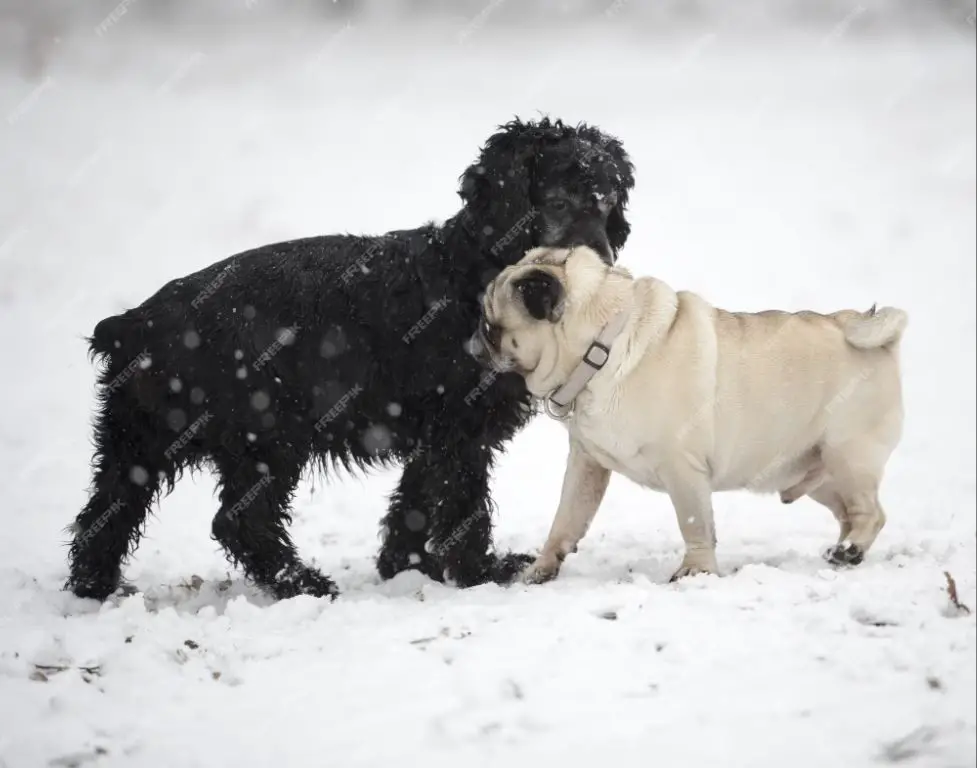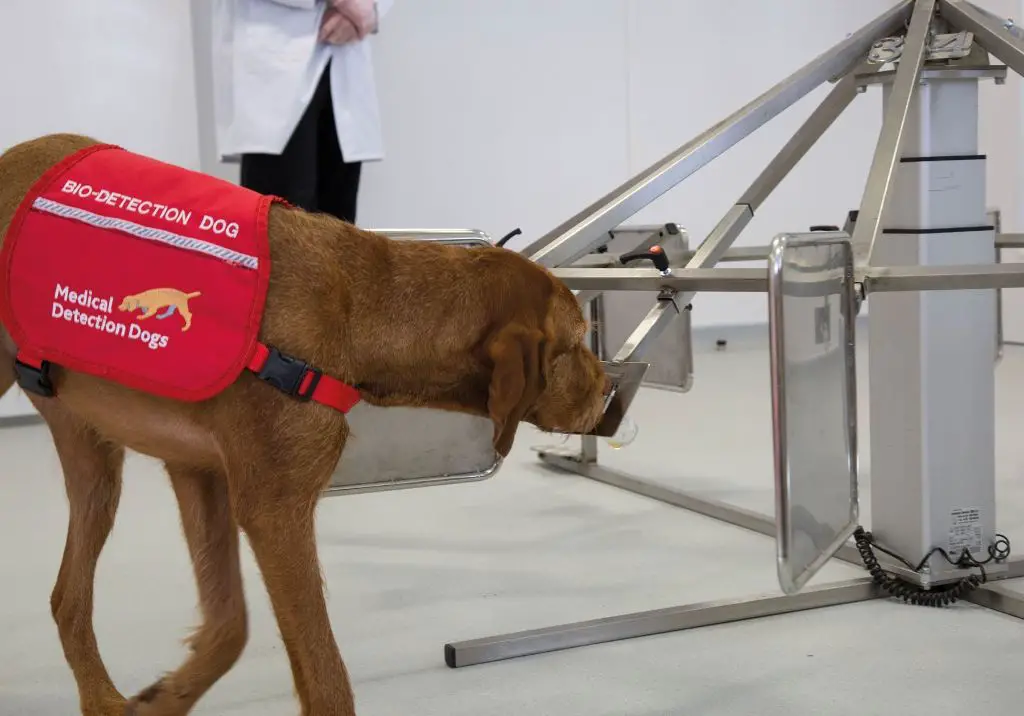Can Dogs Sense Cancer in Their Fellow Canines?
Many dog owners have had the remarkable experience of their canine companion sensing they have cancer before even receiving a diagnosis from their doctor. Dogs are able to detect subtle smell changes emitted from cancerous growths and alert their human to get medical attention. But what about when dogs get cancer themselves – can other dogs detect it?
This article will explore the potential abilities of dogs to sense cancer in their fellow canines. We’ll look at dogs’ incredible sense of smell, behaviors of sick dogs that could indicate cancer detection, possible explanations for how dogs might smell cancer, and more. While research is limited, there are many anecdotal accounts of dogs seeming to identify cancer in other dogs before other obvious symptoms emerge.
Dogs’ Sense of Smell
Dogs have an incredibly advanced sense of smell thanks to their powerful olfactory system. They have up to 300 million scent receptors in their noses, while humans only have about 6 million. The part of a dog’s brain devoted to analyzing smells is also about 40 times larger than that of a human.
This means dogs can detect odors at concentrations nearly 100 million times lower than humans can. Dogs can pick up scents that are weeks or even months old, and can detect substances diluted to 1 or 2 parts per trillion. By comparison, humans can generally only detect odors at concentrations of parts per million or parts per billion.
Thanks to their amazing olfactory capabilities, dogs are able to gather a wealth of information from scents. This allows them to detect health conditions, dangerous substances, hidden people or items, and more based on odors alone.
Behaviors of Sick Dogs
When dogs get sick, whether it’s with cancer or another illness, their behavior often changes in noticeable ways. Some common behavioral changes in sick dogs include:
Lethargy – Sick dogs tend to have less energy and be less active than usual. They may sleep more and be less interested in play, walks, or other physical activities.
Appetite changes – A sick dog’s appetite can go either way – they may stop eating or drink less, or conversely, act hungrier than normal. Lack of appetite or increased hunger are both potential signs of illness.
Less social interaction – Dogs who are feeling unwell tend to interact less with people and other pets in the household. They may isolate themselves, hide, or not seek out human companionship as usual.
House soiling – Some sick dogs lose control of their bladder and bowels or stop signaling when they need to go out. Accidents around the house can indicate illness.
Vomiting/diarrhea – Digestive issues like vomiting and diarrhea are common symptoms of many canine illnesses. They can indicate gastrointestinal problems or systemic diseases.
Weight loss – Significant unexplained weight loss in dogs can signal underlying health problems. Cachexia, or rapid fat and muscle loss, can occur with chronic or terminal diseases.
Paying attention to subtle and overt changes from a dog’s normal behavior can provide early warning signs of sickness and prompt veterinary care.
Dogs Sensing Human Cancers
There are incredible stories of dogs detecting cancers in humans before diagnosis. Some dogs have persistently sniffed or licked areas on their owners’ bodies, leading to the discovery of tumors.
There are now also formal training programs that teach dogs to detect certain cancers. For example, dogs trained by the Medical Detection Dogs charity in the UK can reportedly detect prostate cancer with around 93% accuracy based on urine samples. Other dogs have been trained to detect ovarian, bladder, and colorectal cancers at high rates through breath and stool samples.
While formal training is still limited, these programs demonstrate dogs’ potential to detect human cancers. With their extraordinary sense of smell, dogs may pick up on subtle chemical changes caused by cancer growth. Their ability to smell things undetectable to humans means dogs could play a greater role in early cancer detection and saving lives.
Possible Explanations
There are a few possible explanations for how dogs may be able to tell when another dog has cancer or is sick in some way:

One is that there may be subtle chemical or hormone changes in a sick dog that other dogs can detect. Dogs have an incredibly advanced sense of smell, far beyond what humans are capable of. Their noses have hundreds of millions of scent receptors compared to only 5-6 million in humans. This allows them to pick up on very slight changes in scent that may signal illness.
Another potential factor is that dogs have an innate empathy for other living things. Dogs are pack animals and are very tuned into the wellbeing of other members of their pack. They have evolved to care for each other and look out for signs of injury or sickness. This innate caring and bonding between dogs may allow them to sense when something is wrong with another dog.
Additionally, dogs that live together form very close bonds and spend a great deal of time interacting and observing each other in close proximity. Subtle behavioral or physical changes that may go unnoticed by humans could be apparent to a fellow canine pack member. Their close companionship and attentiveness to each other allows dogs to notice when something is different or amiss.
Observing Other Dogs
Dogs are highly intuitive and seem to notice when something is wrong with other dogs, even before major symptoms appear. There are many anecdotal reports of dogs providing comfort and support to canine companions during illness. For example, a healthy dog may stay close to a sick companion, gently licking them or sleeping next to them. They may intuitively know to be calm and gentle, rather than encouraging play. Some dogs have been observed cuddling up with, grooming, and bringing food to canine friends who are ill or weak.
While we can’t know for certain what dogs are thinking, their behaviors hint that they recognize when another dog is unwell. The precise sensory cues they use are still a mystery – it’s possible they detect subtle changes in smell or behavior that humans can’t perceive. Regardless, their actions demonstrate sympathy and suggest dogs understand sickness in their own species. More research is needed, but these accounts indicate dogs notice differences between healthy packmates and sick companions. Their attentive caregiving reflects complex social bonds within canine groups.
Limitations
While there are many anecdotal stories of dogs seeming to detect illnesses in other dogs or humans, there is a lack of rigorous scientific evidence demonstrating dogs’ ability to consciously know when another dog has cancer. Controlled experiments isolating dogs’ ability to detect cancer are limited.
Dogs primarily rely on their powerful sense of smell, but it is difficult to ascertain if they have an understanding of the significance of the scents they detect. While dogs may pick up on subtle changes in odors from a sick dog, they may not connect those smells with the concept of cancer or other illnesses.
Additionally, dogs notice behavioral changes and social cues from other dogs that could signal sickness without necessarily knowing the specific medical cause. Overall, the limitations of the available research make it challenging to conclusively state dogs are consciously aware when other dogs have cancer.
Training Dogs
There are formal programs to teach dogs how to identify different types of cancer by scent. Studies have shown that dogs can be trained to detect lung, breast, ovarian, bladder, and prostate cancers with high accuracy by sniffing biological samples such as urine, breath, and blood. The training process involves positively reinforcing dogs when they correctly alert their handlers to cancerous samples.
Some organizations provide specialized training to turn adopted shelter dogs into cancer detection dogs. The dogs live with foster families when not training or working. Training builds upon dogs’ natural abilities to create reliable diagnostic tools that can be used proactively to screen for cancer in its early stages, providing a non-invasive testing method. Rigorous protocols ensure accuracy, with the dogs sometimes performing better than lab tests. Early studies suggest trained dogs could substantially improve cancer survival rates through early detection. More research is still needed, but dogs’ scenting capabilities are promising for medical purposes.

Providing Care
If your dog has been diagnosed with cancer, the goal shifts to keeping them as comfortable and happy as possible. Here are some tips for providing palliative care:
Manage their pain. Work closely with your vet to ensure your dog’s pain is properly controlled through medications. Anti-inflammatories, opioids, and other drugs can help minimize their discomfort. Track if they seem restless or distressed.

Consider alternative therapies. Acupuncture, massage, and other complementary treatments may also help with pain relief and quality of life. Always consult your vet before beginning.
Adapt their environment. Provide soft, warm bedding away from drafts and loud noises. Install ramps or lifts if they have trouble with stairs. Reduce stress and stimulation if they seem fatigued.
Monitor their diet. Stick to bland, nutritious meals that are gentle on their stomach. Feeding them by hand can help maintain eating. Ask about appetite stimulants if needed.
Help with hygiene. Gently clean any soiled or matted fur. Change bedding frequently to avoid odors and sores. Your vet can recommend dog diapers if incontinence is an issue.
Above all, cherish every moment you have together through cuddles, playtime, and simply sitting by their side. Your comfort and company means the world to your dog.
Conclusion
In summary, dogs have an incredibly sensitive sense of smell that allows them to detect subtle changes in odor that may indicate illness or cancer. There are many anecdotal accounts of dogs appearing to know when another dog is sick or dying. While the exact mechanisms are still being researched, dogs likely have some innate awareness and perception when it comes to detecting cancer or illness in other canines.
The takeaway is that a dog’s sense of smell and perception should not be underestimated. While we may not fully understand the extent of their abilities, it’s clear dogs have some capacity to sense and be aware of disease in their own species. Trust your intuition if your dog is acting differently around another dog who is ill.